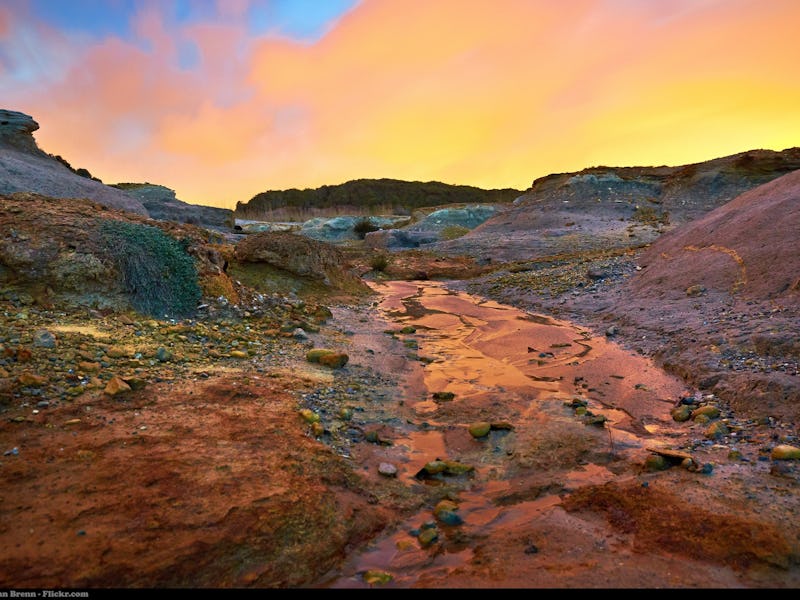After analyzing a 2.4 billion-year-old meteorite, researchers found that Mars had at least two billion years of volcanic activity in its ancient past. It’s possible that these volcanoes could’ve transformed the atmosphere to create an environment that life can survive in.
An international team of scientists analyzed Northwest Africa 7635, a 195.8-gram meteorite discovered in 2012. In a new analysis, published Wednesday in Science Advances, the team found that it was likely that the meteorite was ejected from a volcano back then, which means volcanoes have been active on Mars for at least that long.
According to Thomas Lapen, a geology professor at the University of Houston and lead author of the new paper, this means that Mars was probably volcanic for all its life.
“It’s important that as meteorites are found, we do this work to piece it together to answer questions about the volcanic history of Mars,” Lapen tells Inverse. “The people who are looking at the surfaces are trying to map the lava flows and trying to understand if volcanic activity is similar to geovolcanoes on Earth.”
Although volcanoes are by no means an indicator of life, they are potentially a driver for life which could make a habitat amenable for life to evolve. On Earth, volcanoes recycle carbon dioxide and spewed ashes full of nutrients, both of which help plants grow. Although volcanoes on Earth are extreme habitats, some organisms can survive in those areas and call them home.
Intense volcanic activity could also be a sign of water. In 2015, NASA confirmed that there was flowing water on Mars, and last year, scientists even found volcanic evidence of water.
“We don’t have any proof that there’s life around a Mars volcano, but we do know that if you try to look at the ingredients that come about to create life that flourishes, you need heat, liquid water, organic material,” Jim Head, a geological sciences professor at Brown University who conducted a study in 2014 on how volcanic eruptions on Mars could have caused water to flow, tells Inverse. “If these conditions have been going on for 2 to 3 billion years, if I was living on Mars as a microbe, that would be a good place to be as opposed to somewhere that’s freezing.”
Now, Mars is a cold environment. The temperature at the surface of Mars is currently below the freezing point of water — a hostile environment for life. At shallow depths below the surface, water would freeze. But in areas with magma reservoirs, there will be more heat, which means it’s likely that life can survive. What’s more, researchers found that volcanoes spewed greenhouse gases in the atmosphere, trapping heat and allowing water to flow on the surface. Recently, scientists discovered that interactions between methane and other greenhouse gases allowed Mars to support water.
“If you had volcanic activity in close proximity to water or ice, you get hydrothermal systems which could indeed promote a starting point of life, but it’s certainly not an indicator that life could have formed on Mars,” Peter Mouginis-Mark, researcher at the Hawaii Institute of Geophysics and Planetology, tells Inverse.
The various Martian meteorites scientists have found have not changed much over the course of billions of years or mixed in with other material, which may point to a lack of plate tectonics on Mars. Previously analyzed meteorites range from 327 million to 600 million years old.
This new study also means some of the longest-living volcanoes in the solar system are on Mars. Mars’s largest volcano, Olympus Mons, is almost 17 miles high. That’s almost three times the height of Earth’s tallest volcano, Mauna Kea.
“We could be at a lull right now,” Lapen says. “Given the range of ages, it’s probably likely that volcanic activity is continuing in the present or future.”
To compare, we know Earth has at least four billion years of volcanic activity. When Earth first formed, much of our planet was molten. But over time, Earth cooled and formed a crust, allowing water to flow and life to evolve. Even if we haven’t found life on Mars yet, it’s possible that at one point, the planet went through similar processes as Earth, and life emerged.
“Volcanism is important because it tells you about the interiors of the planet and how they work,” Head says. “It ties into a whole series of questions that are really fundamental about the geological and thermal evolution of the planet. It ties together fundamental questions about planets.”
